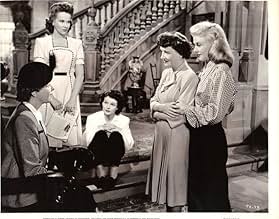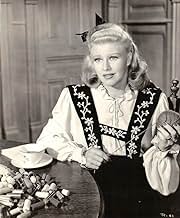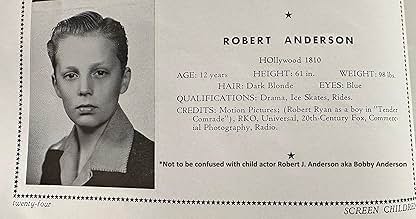Ajouter une intrigue dans votre langueJo Jones, a young defense plant worker whose husband is in the military during World War II, shares a house with three other women in the same situation.Jo Jones, a young defense plant worker whose husband is in the military during World War II, shares a house with three other women in the same situation.Jo Jones, a young defense plant worker whose husband is in the military during World War II, shares a house with three other women in the same situation.
- Récompenses
- 4 victoires au total
- Chris Jones as a boy
- (non crédité)
- Western Union Girl
- (non crédité)
- Minor Role
- (non crédité)
- Boy
- (non crédité)
- Minor Role
- (non crédité)
- Doctor
- (non crédité)
- Mrs. Flanagan - Jo's Mother
- (non crédité)
- Waldo Pierson
- (non crédité)
- Baby
- (non crédité)
- Boy
- (non crédité)
Avis à la une
Four war wives who work in a munitions plant decide that if they pool their salaries and resources that instead of four individual run down rooms for rent that they can rent one spacious house with a bedroom for each, a kitchen, a living room, and a housekeeper. They sell one of the two cars they have between them and use the money to fix up the one remaining car and share it. Apparently this is Communism. Let's just ignore the fact that, at the time, movies were being made that were loaded with pro Russian propaganda because the Americans needed the Russians in the war effort. That was then this is now, as they say.
Other than that, it treads pretty traditional wartime material. One wife (Ruth Hussey) was a bit of a good time girl before the war and rather resents the fact that her good-time husband joined the navy before Pearl Harbor even happened. Another (Kim Hunter) got married on the spur of the moment and had to see her husband off that afternoon. Another (Patricia Collinge) has both a son and a husband in the war.
The central figure, though, is war wife Jo Jones (Ginger Rogers), and most of the film is about her relationship with her soldier/husband Chris (Robert Ryan) before the war as she flashes back to various scenes from their marriage. This part of the film uses a strange device. Whenever there is a scene in which Jo reminisces about Chris, the scene switches to a shot of the two of them in the distance, holding hands with clouds surrounding them, like they are in heaven, before launching into the flashback.
This gets pretty sentimental at times, and Ginger verges on hamming it up, but it did hold my interest for the rather long running time and is a splendid time capsule of the war years.
The main character of the film is Ginger Rogers and is about her dealing with life without her husband, Robert Ryan, who is at war. While he does appear in the first 15 minutes or so of the film, he is primarily seen through a series of flashbacks interspersed through the movie. These all give background as to the life this couple shared before the war. As for Ryan, he came off very well in these vignettes, though Rogers' character seemed a bit too petulant to be believable and I was half expecting Ryan to slap her upside the head to shut her up (folks, I am NOT encouraging spousal abuse--relax)! Later in the film she had mellowed quite a bit and was indeed a very sympathetic and good character.
Ginger and her co-workers begin talking after Ryan goes back to the war and they mutually decide to rent a house together and share expenses. At this point, the story involved the the lives of these four other women--their motivations, back story and character. This is all told in a very effective manner and you really begin to care for the ladies.
The purpose of this tearjerker was to solidify the resolve for the war with the people left behind in the States and in this light, this was a super-effective film. Generally excellent writing, direction and acting make this a film that is easy to connect to and like. It also makes the movie a tough one to watch, as you tend to go through an emotional roller-coaster because of all the ladies' trials and tribulations. A wonderful time capsule of the era and a film well worth seeing.
Oddly, in later years, many of those responsible for this film were labeled "Communists" and the film was cited as an example of these left-leaning sympathies. Other than the fact the ladies live together and share their money, I really can't see how any sane person could construe this as Communism--and what's the matter with sharing a home and expenses anyway? I did that a while back and I don't THINK I'm a Communist!!
In fact, in "Tender Comrade," Trumbo presents us with a puzzle: How could a writer responsible for so much hokey, amateurish dialogue (noted by other reviewers) ever get a reputation as being a great or even a good writer? I admit there were two bright spots in "Tender Comrade" that deserve appreciation for the writer: near the beginning, when two strangers comfort each other as their loved ones depart for the war, and when one character tells another how her marriage "proposal" came about.
Trumbo, though, being Trumbo later has a silly bit when Jo refers to the socialist plan the group adopts ("from each according to her ability ") as "democracy," further demonstrating his confusing of two different and distinct applications as the same.
"Democracy" is a more or less political term describing how leaders are chosen (if, for some reason, anyone wants leaders), and "socialism" is a more or less economic term and more or less philosophical term describing how material goods are more or less shared distributed, anyway. ("Socialism" means government ownership of the means of production, to be more pedantic.) There was nothing wrong with the democratically decided idea of voluntary communalism among the housemates, but if a viewer knows Trumbo's predilection for collectivism at least for others, though not so much for himself the whole scene is discomfiting.
(An excellent book that portrays Trumbo and others, and shows the dichotomy between what they preached, including sometimes in their scripts, and how they lived is "Hollywood Party: How Communism Seduced the American Film Industry in the 1930s and 1940s" by Lloyd Billingsley. It is probably the best book yet on that era. Read especially about Trumbo and his mansion and the lavish parties he loved to throw, even during the times the soldiers were dying.)
Jo's last monologue went on for too long, and really didn't say much it was apparently another failed attempt by Trumbo at being profound and dramatic.
But Ginger Rogers said a lot, even with Trumbo's words. She was a much, much better actress than she seems to be generally regarded. She was much, much more than a great dancer.
With all my complaints about Trumbo, his moronic politics, the lame plot, and his poor writing, still this is a pretty good movie.
It brings back, though not especially well, a particular time in American history.
One of the great ironies of that era: Trumbo waxed indignant about the Nazis and the war they instigated. Yet it is the politics of Trumbo and the other collectivists, Nazis and Communists and other kinds of socialists and fascists, that together created the climate that allowed the unmitigated horrors of World War II.
The collectivist notions that people are not sovereign individuals but are cogs in the machinery of the state, that they must obey their masters, that they must cheerfully march off to war, to kill and/or be killed, that led to the tens of millions of deaths.
Trumbo must share the blame for that evil. He was a vehement proponent of that vicious nonsense.
Still, the cast overcomes the weaknesses of the script. If you watch it on Turner Classic Movies, ignore Robert Osborne's ignorant introduction and closing comments, and concentrate on the people, on their concerns and their efforts at overcoming adversity, on how they deal with their menfolks' being in harm's way, on their daily difficulties, including rationing.
"Tender Comrade" is worth watching.
The scenes between Rogers and Ryan are well-written and finely acted. Trumbo and the actors capture (most unusually for almost any movie) how a generally happy marriage works and how a quarrel might develop. Watch the scenes where these two are together. They are (mostly) free of the propaganda that does not age well.
The rest of the movie. Well, the characters are types and serve as mouthpieces for the "We must sacrifice for the war effort" line being sold by the movie. If one is looking for preposterous moments of the cinema, one can flip forward to the scene where our group home's housekeeper gets in a rage because the butcher slipped an extra piece of bacon in the order. (Followed by a confession of hoarding by one of the girls in the house. Followed by an anti-foreigner tirade by the most ethically challenged of the group residents.) There is some decent 'ol fashioned movie rhetoric in this part, but, mostly, this section is hokum.
Le saviez-vous
- AnecdotesThis film was introduced as evidence when director Edward Dmytryk and writer Dalton Trumbo were hauled before the House Un-American Activities Committee, which was investigating them on suspicion of being Communists. Despite the film's many flag-waving speeches, the communal living arrangements of the ladies in the film was cited as evidence of how Dmytryk and Trumbo attempted to brainwash unsuspecting American moviegoers with Communist propaganda. As even more damning evidence, there was the use of the word "Comrade" in the title.
- GaffesWhen Chris comes around the hanging laundry in Jo's flashback, we hear the end of his whistling "You Made Me Love You," but his face is totally relaxed, and clearly not that of a person who is whistling.
- Citations
Jo Jones: We're going to pool all of our salaries and we'll pay the rent, take care of the expenses of the house, and what's left over, we'll split five ways. You see, we're running this joint like a democracy!
Manya Lodge: Like a democracy! Oh, that's good! That's good. Once, in Germany, we had a democracy. But we...
Helen Stacey: You lost it.
Manya Lodge: Nein. We did not lose it. We let it be murdered - like a little child.
- Crédits fousTO MY WIFE - Teacher, Tender Comrade Wife, A fellow-farer true through life, Heart-whole and soul-free, The August Father, Gave to me. Robert Louis Stevenson
- ConnexionsFeatured in Hollywood the Golden Years: The RKO Story: Dark Victory (1987)
- Bandes originalesSymphony No. 40 in G minor K. 550
(1788) (uncredited)
Written by Wolfgang Amadeus Mozart
First movement played on the radio in the opening scene
Meilleurs choix
- How long is Tender Comrade?Alimenté par Alexa
Détails
- Date de sortie
- Pays d’origine
- Langues
- Aussi connu sous le nom de
- Kärlekskamrater
- Lieux de tournage
- Société de production
- Voir plus de crédits d'entreprise sur IMDbPro
- Durée1 heure 42 minutes
- Couleur
- Rapport de forme
- 1.37 : 1
Contribuer à cette page


































